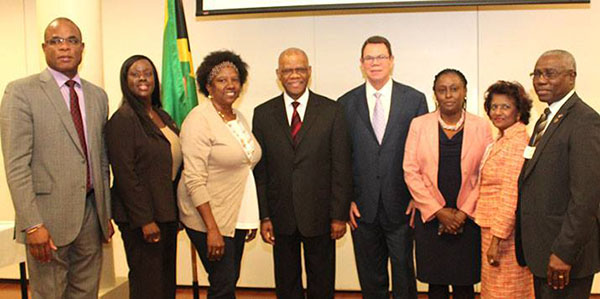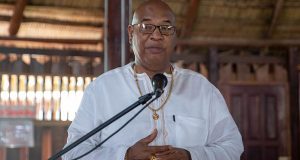Photo above: Dr. Warren Smith (fourth right) with members of the Toronto-Based CARICOM Consular Corps, following an address to that group on October 21, 2014 in Toronto. (L-R) Michael Willius, Consul General of Saint Lucia; CJ Augustine-Kanu, Honourary Consul General of Grenada; Ann Marie Layne, Consul General of Antigua and Barbuda; Seth George Ramocan, Consul General of Jamaica; Frances Delsol, Trade & Investment Commissioner of Dominica; Dr. Vidhya Gyan Tota-Maharaj, Consul General of Trinidad and Tobago; and Haynesley Benn, Consul General of Barbados.
TORONTO, Ontario – Creation of a business friendly climate and implementing appropriate legislation to attract investment are key to Caribbean economic growth.
This was among the pillars for growth outlined by Dr. Warren Smith, president of the Caribbean Development Bank who addressed a group of Caribbean diplomatic and civic leaders at the Jamaican/Canadian Association Headquarters on Arrow Road in Toronto last Tuesday evening.
Hosted by Seth George Ramocan, Jamaica’s Consul General to Toronto and Dean of the CARICOM Consular Corps, Dr. Smith gave insight into areas that can fillip economic growth and urged members of the diaspora to actively participate.
“There is a raft of reforms that the Caribbean needs to undertake to create a business-friendly environment, in which both foreign and local investment will spur export-led growth. Many of these reforms are captured in useful competitiveness indices like those computed for the World Bank’s Doing Business survey. Such reforms are now an integral part of the framework of all IMF-funded adjustment programs,” Dr. Smith said.
Caribbean Countries ranked, on average, 100 out of 189 countries surveyed for World Bank’s most recent Doing Business index. However, several countries are undertaking reform which should improve the ease of doing business and the diaspora were encouraged to support and anticipate those changes.
“The creation of a business-friendly climate will only lead to robust and sustainable growth, if the domestic and international private sectors take advantage of the vast new economic opportunities that are available in our Region. Members of the Caribbean diaspora, with your knowledge of the business culture and your links to the Caribbean business community, are well positioned to take advantage of these opportunities that are emerging in our rapidly changing environment. I applaud those of you who have already taken the plunge; and encourage others to come on board,” Dr Smith said.
The gathering learnt that a key priority of the CDB is on reduction in the cost of energy, especially electricity costs which represent a major impediment to competitiveness and growth in most Caribbean economies.
Households across the region pay between US 0.30 cents and US 0.40 cents per kilowatt hour (kWh) with significant variations. Household tariffs in 2012 ranged from a high of approximately US 0.48 cents per kwh in Dominica and Montserrat to a low of US 0.25 cents per kWh in Belize where the energy mix includes some renewables, namely hydro and biomass. The outliers are households in fossil-fuel-endowed Suriname and Trinidad and Tobago, where rates were under US 0.07 cents per kWh. These rates are approximately four times the average rates in North America. A similar situation obtains for commercial and industrial rates. An enterprise survey conducted by the World Bank in 2010 found that at least 30 (%) of Caribbean firms identified electricity costs as a major constraint to doing business.
“The Bank is convinced that the time is right for Caribbean countries to pursue realistic goals in the energy sector, and to substantially reduce electricity cost, by taking advantage of recent technological advances in the area of renewable energy and energy efficiency,” Dr Smith said.
Following his address, Dr Smith responded to questions on investment paths; the impact on labour and productivity; and the importance of agriculture and food security.
The Caribbean Development Bank is a regional financial institution established in 1970 for the purpose of contributing to the harmonious economic growth and development of the member countries in the Caribbean.
There are nineteen regional borrowing member countries, three regional non-borrowing member countries and five non-regional, non-borrowing member countries.
Members outside of the region are Canada, China, Colombia, Germany, Italy, Mexico, UK and Venezuela. As of December 31, 2013, CDB had total assets of USD2.57bn (This includes USD1.45Bn of ordinary Capital resources and US1.12Bn of Special Funds Resources.)
 Pride News Canada's Leader In African Canadian & Caribbean News, Views & Lifestyle
Pride News Canada's Leader In African Canadian & Caribbean News, Views & Lifestyle





